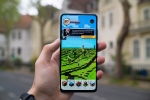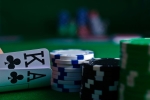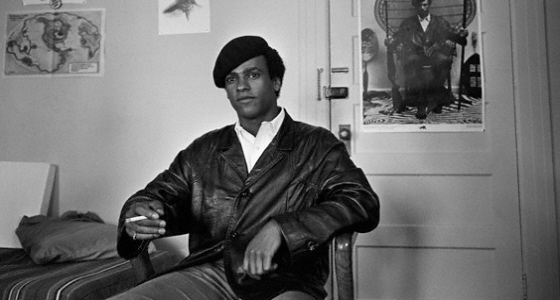
The following interview appeared in The Movement Magazine 1968, Newton was murdered August 1989, at the age of 47 and by publishing this interview, we are certainly supporting his dying words “You can kill my body, and you can take my life but you can never kill my soul. My soul will live forever!"”
Activism
THE MOVEMENT: The question of nationalism is a vital one in the black movement today. Some have made a distinction between cultural nationalism and revolutionary nationalism. Would you comment on the differences and give us your views?
HUEY P. NEWTON: There are two kinds of nationalism, revolutionary nationalism and reactionary nationalism. Revolutionary nationalism is first dependent upon a people's revolution with the end goal being the people in power. Therefore to be a revolutionary nationalist you would by necessity have to be a socialist. It you are a reactionary nationalist you are not a socialist and your end goal to the oppression of the people.
Cultural nationalism, or pork chop nationalism, as I sometimes call it, is basically a problem of having the wrong political perspective. It seems to be a reaction instead of responding to political oppression. The cultural nationalists are concerned with returning to the old African culture and thereby regaining their identity and freedom. In other words, they feel that the African culture will automatically bring political freedom. Many times cultural nationalists fall into line as reactionary nationalists.
Papa Doc in Haiti is an excellent example of reactionary nationalism. He oppresses the people but he does promote the African culture. He's against anything other than black, which on the surface seems very good, but for him it is only to mislead the people. He merely kicked out the racists and replaced them with himself as the oppressor. Many of the nationalists in this country seem to desire the same ends.
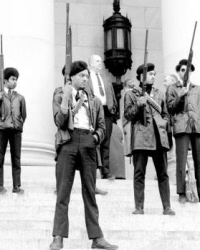 The Black Panther Party, which is a revolutionary group of black people, realizes that we have to have an identity. We have to realize our black heritage in order to give us strength to move on and progress. But as far as returning to the old African culture, it's unnecessary and it's not advantageous in many respects. We believe that culture itself will not liberate us. We're going to need some stronger stuff.
The Black Panther Party, which is a revolutionary group of black people, realizes that we have to have an identity. We have to realize our black heritage in order to give us strength to move on and progress. But as far as returning to the old African culture, it's unnecessary and it's not advantageous in many respects. We believe that culture itself will not liberate us. We're going to need some stronger stuff. Revolutionary Nationalism
A good example of revolutionary nationalism was the revolution in Algeria when Ben Bella took over. The French were kicked out but it was a people's revolution because the people ended up power. The leaders that took over were not interested in the profit motive where they could exploit the people and keep them in a state of slavery. They nationalized the industry and plowed the would be profits into the community. That's what socialism is all about in a nut The people's representatives are in office strictly on the leave of the people. The wealth of the country is controlled by people and they are considered when ever modifications in the industries are made.
The Black Panther Party is a revolutionary Nationalist group and we see a major contradiction between capitalism in this country and our interests. We realize that this country became very rich upon slavery and that slavery is capitalism in the extreme. We have two evils to fight, capitalism and racism. We must destroy both racism and capitalism.
MOVEMENT: Directly related to question of nationalism is the question of unity within the black community. There has been some question about this since the Black Panther Party has run candidates against other black candidates in recent California elections. What is your position an this matter?
HUEY: Well a very peculiar thing has happened. Historically you got what Malcolm X calls the field nigger and the house nigger. The house nigger had privileges, a little more. He got the worn-out clothes of the master and he didn't have to work as hard as the field black. He came to respect the master to such an extent until he identified with the master because he got a few of the leftovers that the field blacks did not get. And through this identity with him, he saw the slavemaster's interest being his interest. Sometimes he would even protect the slavemaster more than the slavemaster would protect himself. Malcolm makes the point that if the master's house happened to catch on fire the house Negro will work harder than the master to put the fire out and save the master's house. While the field Negro, the field blacks was praying that house burned down. The house black identified with the master so much when the master would get sick the house Negro would say, "Master, we's sick!"
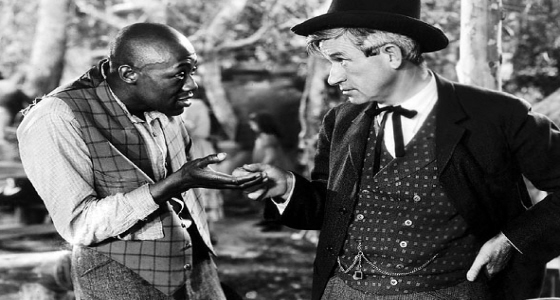
Black Bourgeoisie
The Black Panther Party are the field blacks, we're hoping the master dies if he gets sick. The Black bourgeoisie seem to be acting in the role of the house Negro. They are pro-administration. They wouldlike a few concessions made, but as far as the overall setup, they have a little more material goods, a little more advantage, a few more privileges than the black have-nots; the lower class. And so they identify with the power structure and they see their interests as the power structure's interest. In fact, it's against their interest.
The Black Panther Party was forced to draw a line of demarcation. We are for all of those who are for the promotion of the interests of the black have-nots, which represents about 98% of blacks here in America. We're not controlled by the white mother country radicals nor are we controlled by the black bourgeois. We have a mind of our own and if the black bourgeoisie cannot align itself with our complete program, then the black bourgeoisie sets itself up as or enemy. And they will be attacked and treated as such.
MOVEMENT: The Black Panther Party has had considerable contact with white radicals since its earliest days. What do you see as the role of these white radicals?
Huey: The white mother country radical is the off-spring of the children of the beast that has plundered the world exploiting all people, concentrating on the people of color. These are children of The beast that seek now to be redeemed because they realize that their former heroes who were slave masters and murderers, put forth ideas that were only facades to hide the treachery they inflicted upon the world. They are turning their backs on their fathers.The white mother country radical, resisting the system, becomes somewhat of an abstract thing because he's not oppressed as much as black people are. As matter of fact his oppression is somewhat abstract simply because he doesn't have to live in a reality of oppression.
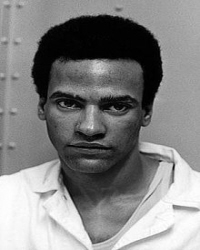 Black people in America and colored people throughout the world suffer not only from exploitation, but they suffer from racism. Black people here in America, in the black colony, are oppressed because we're black and we're exploited . The whites are rebels, many them from the middle class and as far as any overt oppression this is not case. So therefore I call their rejection of the system somewhat of an abstract thing. They're looking for new heroes. They're looking to wash away hypocrisy that their fathers have presented to the world. In doing this they see the people who are really fighting for freedom. They see the people are really standing for justice and equality and peace throughout the world. They are the people of Vietnam, the people of Latin America, the people of Asia, the people of Africa, and the black people in the black colony here in America. ©
Black people in America and colored people throughout the world suffer not only from exploitation, but they suffer from racism. Black people here in America, in the black colony, are oppressed because we're black and we're exploited . The whites are rebels, many them from the middle class and as far as any overt oppression this is not case. So therefore I call their rejection of the system somewhat of an abstract thing. They're looking for new heroes. They're looking to wash away hypocrisy that their fathers have presented to the world. In doing this they see the people who are really fighting for freedom. They see the people are really standing for justice and equality and peace throughout the world. They are the people of Vietnam, the people of Latin America, the people of Asia, the people of Africa, and the black people in the black colony here in America. ©White Revolutionaries
This presents somewhat of a problem, in many ways to the black revolutionary, especially to the cultural nationalist. The cultural nationalist doesn't understand the revolutionaries because he can't see why anyone white would turn on the system So they think that maybe this is some more hypocrisy being planted by white people. I personally think that there are many young white revolutionaries who are sincere in attempting to realign themselves with mankind, and to make a reality out the high moral standards that their fathers and forefathers only expressed. In pressing for new heroes the young white revolutionaries found the heroes in the black colony at home and in the colonies throughout the world.
The young white revolutionaries raised the cry for the troops to withdraw from Vietnam, hands off Latin America, withdraw from the Dominican Republic and also to withdraw from the black community or the black colony. So you have a situation in which the young white revolutionaries attempting to identify with the oppressed people of the colonies and against the exploiter.
The problem arises then in what part they can play. How can they aid the colony? How can they aid the Black Panther Party or any other black revolutionary group? They can aid the black revolutionaries first by simply turning away from the establishment, and secondly by choosing their friends. For instance, they have a choice between whether they will be a friend of Lyndon Baines Johnson or a friend of Fidel Castro. A friend of Robert Kennedy or a friend of Ho Chi Minh. And these are direct opposites. A friend of mine or a friend of Johnsons. After they make this choice then the white revolutionaries have a duty and a responsibility to act.
The imperialistic or capitalistic system occupies areas. It occupies Vietnam now. They occupy them by sending soldiers there, by sending policeman there. The policemen or soldiers are only a gun in the establishments hand. They make the racist secure in his racism. The gun in the establishment's hand makes the establishment secure in its exploitation. The first problem it seems is to remove the gun from the establishment's hand. Until lately the white radical has seen no reason to come into conflict with the policemen in his own community. The reason I said until recently is because there is friction now in the mother country between the young white revolutionaries and the police. Because now the white revolutionaries are attempting to put some of their ideas into action, and there's the rub. We say that it should be a permanent thing.
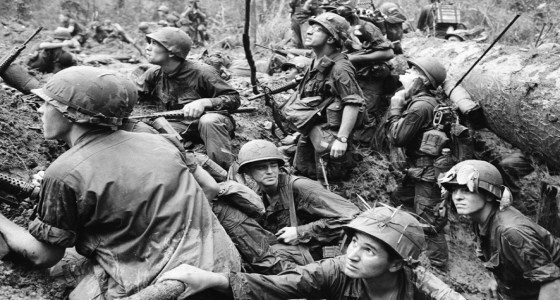
Black people are being oppressed in the colony by white policemen, by white racists. We are saying they must withdraw. We realize that it is not only the Oakland police department but rather the security forces in general. On April 6 it wasn't just the Oakland police department who ambushed the Panthers. It was the Oakland police department, the Emeryville police department and I wouldn't be surprised if there were others. When the white revolutionaries went down to close up the Army terminal in October 1965 it wasn't the Oakland police by themselves who tried to stop them. It was the Oakland police, the Berkeley police, the Highway Patrol, the Sheriff's Department and the national guard was standing by. So we see that they're all part of one organization. They're all a part of the security force to protect the status quo; to make sure that the institutions carry out their goals. They're here to protect the system.
As far as I'm concerned the only reasonable conclusion would be to first realize the enemy, realize the plan, and then when something happens in the black colony-when we' re attacked and ambushed in the black colony--then the white revolutionary students and intellectuals and all the other whites who support the colony should respond by defending us, by attacking the enemy in their community. Every time that we're attacked in our community there should be a reaction by the white revolutionaries; they should respond by defending us, by attacking part of the security force. Part of that security force that is determined to carry out the racist ends of the American institutions.
As far as our party is concerned, the Black Panther Party is an all black party, because we feel as Malcolm X felt that there can be no black-white unity until there first is black unity. We have a problem in the black colony that is particular to the colony, but we're willing to accept aid from the mother country as long as the mother country radicals realize that we have, as Eldridge Cleaver says in SOUL ON ICE, a mind of our own. We've regained our mind that was taken away from us and we will decide the political as well as the practical stand that we'll take. We'll make the theory and we'll carry out the practice. It's the duty of the white revolutionary to aid us in this.
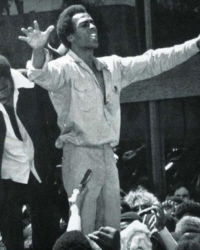 So the role of the mother country radical and he does have a role, is to first choose his friend and his enemy and after doing this, which it seems he's already done, then to not only articulate his desires to regain his moral standard and align himself with humanity, but also to put this into practice by attacking the protectors of the institutions.
So the role of the mother country radical and he does have a role, is to first choose his friend and his enemy and after doing this, which it seems he's already done, then to not only articulate his desires to regain his moral standard and align himself with humanity, but also to put this into practice by attacking the protectors of the institutions. MOVEMENT: You have spoken a lot about dealing with the protectors of the system, the armed forces. Would you like to elaborate on why you place so much emphasis on this?
HUEY: The reasons that I feel very strongly about dealing with the protectors of the system is simply because without this protection from the army, the police and the military, the institutions could not go on in their racism and exploitation. For instance, as the Vietnamese are driving the American imperialist troops out of Vietnam, It automatically stops the racist imperialist institutions of America from oppressing that particular country. The country cannot implement its racist program without the guns. And the guns are the military and the police. If the military were disarmed in Vietnam, then the Vietnamese would be victorious.
We are in the same situation here in America. Whenever we attack the system the first thing the administrators do is to send out their strongarm men. If it's a rent strike, because of the indecent housing we have, they will send out the police to throw the furniture out the window. They don't come themselves. They send their protectors. So to deal with the corrupt exploiter you are going to have to deal with his protector, which is the police who take orders from him. This is a must.
MOVEMENT: Would you like to be more specific on the conditions which must exist before an alliance or coalition can be formed with predominantly white groups? Would you comment specifically on your alliance with the California Peace and Freedom Party?
HUEY: We have an alliance with the Peace and Freedom Party. The Peace and Freedom Party has supported our program in full and this is the criterion for a coalition with the black revolutionary group. If they had not supported our program in full, then we would not have seen any reason to make an alliance with them, because we are the reality of the oppression. They are not. They are only oppressed in an abstract way; we are oppressed in the real way. We are the real slaves! So it's a problem that we suffer from more than anyone else and it's our problem of liberation. Therefore we should decide what measures and what tools and what programs to use to become liberated. Many of the young white revolutionaries realize this and I see no reason not to have a coalition with them.
MOVEMENT: Other black groups seem to feel that from past experience it is impossible for them to work with whites and impossible for them to form alliances. What do you see as the reasons for this and do you think that the history of the Black Panther Party makes this less of a problem?
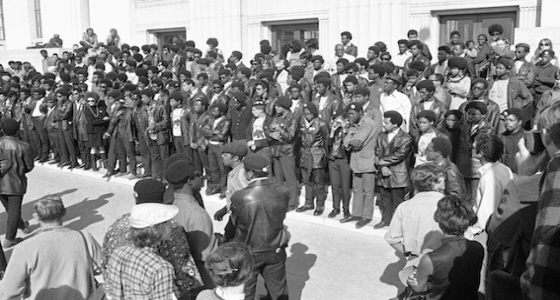
SNCC and Liberals
HUEY: There was somewhat of an unhealthy relationship in the past with the white liberals supporting the black people who were trying to gain their freedom. I think that a good example of this would be the relationship that SNCC had with its white liberals. I call them white liberals because they differ strictly from the white radicals. The relationship was that the whites controlled SNCC for a very long time. From the very start of SNCC until here recently whites were the mind of SNCC, They controlled the program of SNCC with money and they controlled the ideology, or the stands SNCC would take. The blacks in SNCC were completely controlled program-wise; they couldn't do any more than these white liberals wanted them to do, which wasn't very much. So the white liberals were not working for self-determination for the black community. They were interested in a few concessions from the power structure. They undermined SNCC's program.
Stokely Carmichael came along and realizing this started to follow Malcolm X's program of Black Power. This frightened many of the white liberals who were supporting SNCC. Whites were afraid when Stokely came along with Black Power and said that black people have a mind of their own and that SNCC would be an all black organization and that SNCC would seek self-determination for the black community. The white liberals withdrew their support leaving the organization financially bankrupt. The blacks who were in the organization, Stokely and H. Rap Brown, were left very angry with the white liberals who had been aiding them under the disguise of being sincere. They weren't sincere.
The result was that the leadership of SNCC turned away from the white liberal, which was very good. I don't think they distinguished between the white liberal and the white revolutionary, because the white revolutionary is white also and they are very much afraid to have any contact whatsoever with white people. Even to the point of denying that the white revolutionaries could give support, by supporting the programs of SNCC in the mother country. Not by making any programs, not by being a member of the organization, but simply by resisting. Just as the Vietnamese people realize that they are supported whenever other oppressed people throughout the world resist. Because it helps divide the troops. It drains the country militarily and economically. If the mother country radicals are sincere then this will definitely add to the attack that we are making on the power structure. The Black Panther Party's program is a program where we recognize that the revolution in the mother country will definitely aid us in our freedom and has everything to do with our struggle!
A big thank you to Skip and www.hippy.com , a brilliant site
Part two here
Part three here



